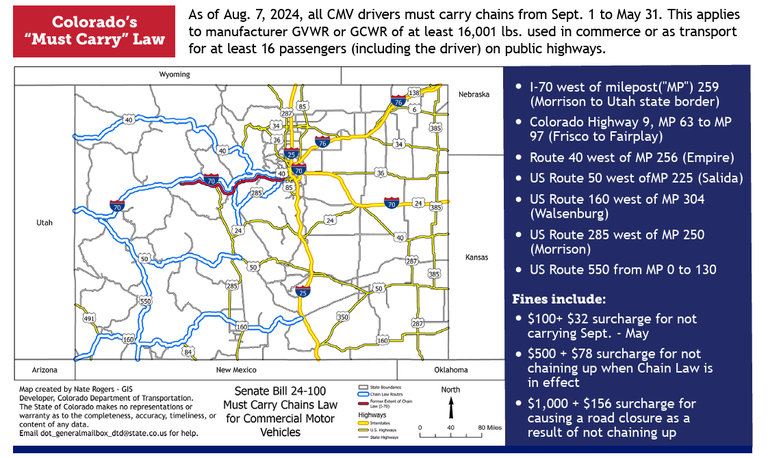1,400 miles, 130 chain stations: Colorado’s “Must Carry Law”
News Release
Denver — With winter-like conditions already impacting some of the state's mountain highways, the Colorado Department of Transportation is reminding commercial motor vehicle drivers that Colorado’s chain season is officially underway and safety starts with preparation.
This is the second year that Colorado’s updated chain law is in effect. The “Must Carry Law,” signed by Gov. Jared Polis in 2024, requires all CMV drivers to carry chains from Sept. 1 to May 31. This applies to vehicles with a combined weight of more than 16,000 pounds used in commerce or as transport for at least 16 passengers (including the driver) on public highways. Failure to comply can result in fines of $500 for not carrying chains and up to $1,000 plus surcharge for blocking the roadway. For more information on the details of the law and chain-up stations across the state, CDOT has compiled an in-depth fact sheet, hosted on their website.

Must Carry Chain Law in Action
- More than 1,300 Must Carry Chain Law citations were issued by law enforcement during the 2024-2025 chain season.
- CMV traffic accounts for roughly 10% of vehicles on I-70, with chains helping to reduce roadway closures and delays.
- Over 1,400 centerline miles of highway are subject to Colorado’s Must Carry Chain Law.
- There are 130 designated chain stations along Colorado’s roadway network. Twenty-two are situated on I-70’s mountain corridor.
Colorado’s mountain highways are uniquely challenging with steep grades, unpredictable weather and heavy snow, and commercial vehicles and buses have a larger footprint on roadways where chains are required. Vehicles without proper traction can cause road closures, impacting the ability to move goods, services and people throughout our state safely. However, chaining up is just one of the steps CMV drivers prepare to safely deliver goods in Colorado winters.
Driver Preparedness
Before starting their routes, CMV drivers check forecasts to adjust schedules around storm systems and ensure that their chains are on board and ready for use. When storms hit, drivers are often required to pull into chain-up stations, many times after dark and in below freezing temperatures.
After chaining, drivers continue to haul over Colorado’s steep grades, at reduced speeds, before stopping again to remove the chains. These added steps are layered with mandated rest requirements and the long hours already demanded by the job. Their efforts keep Colorado’s roads open, freight moving and mountain communities connected, even during the harshest storms.
“For commercial drivers, winter in Colorado requires extra preparation and resilience,” said CDOT’s Freight Mobility and Safety Branch Manager, Craig Hurst. “The Must Carry Law is about ensuring drivers have the tools they need to safely navigate our roads and mountain passes, all while protecting other roadway users.”
For more information about Colorado’s Must Carry Law, including videos and tutorials, visit freight.colorado.gov/mountain-rules/chain-up-tips. For real-time road conditions and chain law alerts, visit COTrip.org.
Crash Not Accident
Note to reporters: Crashes are no accident — they are preventable. We would appreciate you saying 'crash' instead of 'accident' when reporting.
